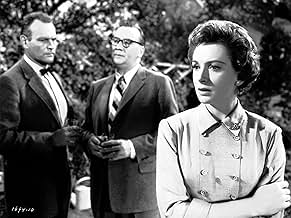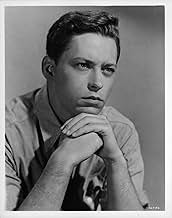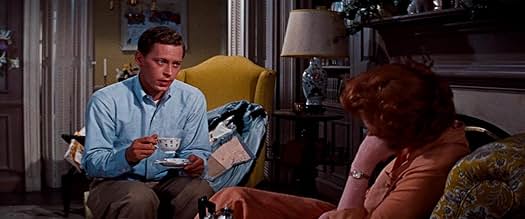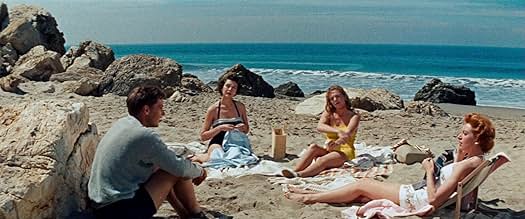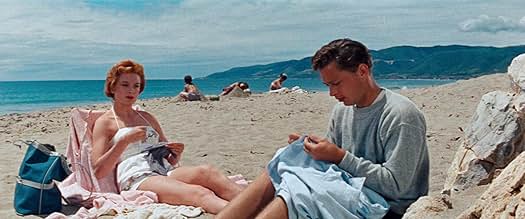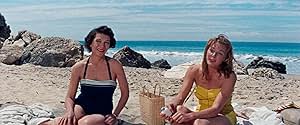अपनी भाषा में प्लॉट जोड़ेंA new senior at a boy's prep school, finds himself harassed by the machismo culture of his classmates and the unfeelingly behavior by his father, only being treated with decency by his roomm... सभी पढ़ेंA new senior at a boy's prep school, finds himself harassed by the machismo culture of his classmates and the unfeelingly behavior by his father, only being treated with decency by his roommate and with affection by the coach's wife.A new senior at a boy's prep school, finds himself harassed by the machismo culture of his classmates and the unfeelingly behavior by his father, only being treated with decency by his roommate and with affection by the coach's wife.
- 1 BAFTA अवार्ड के लिए नामांकित
- 1 जीत और कुल 3 नामांकन
- Bob
- (बिना क्रेडिट के)
- Alex
- (बिना क्रेडिट के)
- Boy in Soda Fountain
- (बिना क्रेडिट के)
फ़ीचर्ड समीक्षाएं
An Important Film that provides good historic perspective on the treatment of homosexuality in film.
"Tea and sympathy" might be the best of all Minnelli non-musicals in the fifties/sixties.We even forget that John Kerr (25 at the time) was much too old for this part of an adolescent in search of his sexual identity.John Kerr was the victim of "the cobweb" a couple of years before.His character in "tea and sympathy'" is a relative of the one I mention above as well as of the young hero of "home from the hill" (1960) "Tea and sympathy " was a courageous move for the fifties:it took a lot a nerve to show a boy at the university who refused "normality".What's normality anyway?Is it ,for a man ,swearing or climbing mountains? as luminous Deborah Kerr says.When you're not fond of sports,when you like the ladies' tea and sympathy,when you enjoy music and poetry ,then you are a "sister boy" and maybe even worse...You've got to pay attention to see what heavy things Minnelli was saying at a time it was not that much good to be DIFFERENT.Robert Anderson's play was years ahead and had (or should have had) a deep beneficial influence on mentalities.The scene where one of the "true" boys teaches his unfortunate pal the right way to walk had certainly a strong influence on French director Claude Miller 's "la meilleure façon de marcher"(1975).
But the play (and Minnelli's excellent movie) are often a ruthless portrayal of the "straights" :the young hero's father is a really dumb man -where is his wife by the way? Is she dead? or the perfect housewife?-,a narrow-minded crude character devoid of all the qualities of the heart.The fact that he asks the virile teacher to "make a man of his son" proves his stupidity.This teacher (D.Kerr's husband) ,under a he-man mask actually hides a vulnerability which his sensitive wife feels.He,too , is longing for tenderness,love and affection,but as it's not worthy of a true man,his life will be an unfulfilled one.
Deborah Kerr RULES.She wins over the audience with a mesmerizing performance .It's not only the "sister boy" who falls in love with her.Anyone who sees this wonderful film will too.
NB:in the play,which was sweetened ,Tom is called "Grace" or "Gracie",and the words "queer" and "fairy" are used.
I didn't find this movie dated at all. Not only does it offer a glimpse of what life was like in the 1950's, which should have some historical significance to younger folks today, but its message regarding the stifling conditions of rigid social conformity is ageless. Although it is obviously a stage adaptation, praise goes to director Vincente Minnelli for so ably bringing it to the wide screen. The three leads, Deborah Kerr, John Kerr (no relation), and Leif Erickson, who all revived their original Broadway roles, are exceptional. I also loved the scene when Al (Daryl Hickman), Tom's socially pressured roommate, attempts to provide Tom with tips on how to appear more manly to the world. Norma Crane, who wonderfully played Golde in the film version of "Fiddler on the Roof", perfectly portrays the very cruel town harlot, Ellie Martin. Ironically, Edward Andrews depicts Tom's demanding father as anything but manly, perhaps intentionally. Be as I say, Tommy, not as I am.
While Tom at first appears to be the focus of the film, the stories of Laura and Bill Reynolds, his dorm house parents, slowly begin to overshadow Tom's miserable situation. This represents some excellent work by screenplay writer Robert Anderson, who also wrote first-rate scripts for "The Nun's Story", "The Sand Pebbles, and "I Never Sang For My Father." And what is Bill Reynolds doing at the end of the movie? Listening to phonograph records by himself. What's the matter with him? My only criticism is that it runs a bit long and could have been reduced in length without losing its powerful impact.
Yes, Tea and Sympathy addresses homosexuality -- but there isn't a single bit of *actual* homosexuality in the film. It's not about actual homosexuality but about perceived homosexuality... and the fear thereof. It's completely obvious within five minutes that Tom Lee is completely in love with Laura, and there's nothing whatsoever in the film that suggests he might feel romantic or erotic attraction to men... nor is there anything whatsoever in the film that suggests that he's confused about whether or not he likes men (or men and women).
Of course, back in the fifties, most, really all, film language that dealt with homosexuality was coded. Things *stood* for homosexuality, rather than directly displaying it. So, one could be tempted to say that Tom Lee is a coded closet case. But, far too much of the script is explicitly about the external challenge of his being seen as, or feared to be, queer; while absolutely none of it is about an internal struggle with his orientation. He struggles with the perception (his own and others) of his masculinity, but nothing in the film indicates Tom himself might think he's queer.
And, again, his obvious infatuation with Laura permeates the whole film. He doesn't *stalk* her at the beginning because he needs a sympathetic ear...
And when she tries to set him up on a tea date with a girl, there's no sense that she fears Tom is queer, that she must straighten him out. But she *is* horribly concerned that they keep others from thinking it. She even has one line of dialog in which she speaks to him directly of the need to "nip this in the bud" or somesuch. Even in a 1956 film, it wouldn't make any sense to think that this woman would think a tea date would "straighten" Tom out; but it does make sense that she would believe it could be part of repairing his reputation.
The closest the film ever gets to suggesting the potential (much less the actuality) of Tom being queer is when Laura voices fears that Tom being treated "not like a man" could lead him to *become* unsure of himself as a man... If you want to infer she fears he *might* become queer because of this, there's room especially given the overall coding Hollywood demanded of such material, but, again, you've got everything else in the film to work against this interpretation. And it's an interpretation of what Tom *might* be in the future, not what he is in the timeframe of the film itself.
Furthermore, even this is only the perception of another character -- not Tom himself displaying any indication that HE fears he may one day "become" queer.
Tom's conflict revolves around his trying to navigate his way in the world as the *atypical* man he is, find his identity as a man, and be accepted as such... in a world that doesn't want to.
And it's *other* people, not Tom, who clearly (altho thru coded film language) see him as queer, or fear he might be.
And while I understand that Anderson's play was more forceful in suggesting that the housemaster was a repressed homosexual, it's *really* stretch to see it in the film version. The building blocks of the coding are there (yeah, he hangs out with the boys and roughhouses with them, and he neglects his wife), but the film also goes to considerable lengths to paint him as a "typical" man who's lost interest in his marriage once he's claimed his wife. What with that, and the context of a film in which the main character is so clearly painted as a perceived homosexual rather than as an actual one (even in potentiality), the coding is so incredibly watered down that it's really not even there at all, effectively.
Tea and Sympathy is a pretty compelling film about the definitions of masculinity and gender role enforcement and homophobia. It's really upsetting to see that homophobia and misogyny and incredible pressure to conform on screen, but it is compelling. Even if Minnelli turned out to be a horrible choice for director.
His avoidance of close-ups reveals him to be, in this case at least, what feels to me like a very selfish director. More than the topic, more than the writing, it's the performances of Kerr and Kerr that make this film. They are constantly having to fight Minnelli's apparent desire to keep them at a visual distance from us. I guess in a way it's a credit to both the stars and Minnelli himself that he could get such strong work from them despite the sparseness of close-ups that the film so desperately needed.
It's as if Minnelli thought that he was -- or should be -- directing a pageant rather than a drama. "Look, I can make even an intimate, human drama great in WIDESCREEN!!!" Except that you can't, Vincent. I don't care about you in Tea and Sympathy, Mr. Minnelli, I care about Tom and Laura. Give me the characters!
Matthew
क्या आपको पता है
- ट्रिवियाBringing the play to the screen resulted in a years-long struggle with the production code office and the Catholic National Legion of Decency because of the play's inclusion of homosexuality, adultery and prostitution. At one point there was consideration that the film be produced by an independent production company outside of the studio system.
- गूफ़While Tom Lee (Class of 1946) is still in school, Laura Reynolds drives a 1950 Dodge.
- भाव
Laura Reynolds: Manliness is not all swagger and mountain climbing. It's also tenderness and gentleness and consideration.
- कनेक्शनFeatured in Homo Promo (1991)
- साउंडट्रैकThe Joys of Love
(Plaisir d'Amour)
Music by Jean-Paul-Égide Martini
French lyrics by Jean-Pierre Claris de Florian
English lyrics by Richard Dyer-Bennett
Performed by John Kerr (dubbed by Gene Merlino)
टॉप पसंद
- How long is Tea and Sympathy?Alexa द्वारा संचालित
विवरण
- रिलीज़ की तारीख़
- कंट्री ऑफ़ ओरिजिन
- भाषा
- इस रूप में भी जाना जाता है
- Té y simpatía
- फ़िल्माने की जगहें
- उत्पादन कंपनी
- IMDbPro पर और कंपनी क्रेडिट देखें
बॉक्स ऑफ़िस
- बजट
- $17,37,000(अनुमानित)
- चलने की अवधि2 घंटे 2 मिनट
- ध्वनि मिश्रण
- पक्ष अनुपात
- 2.55 : 1


